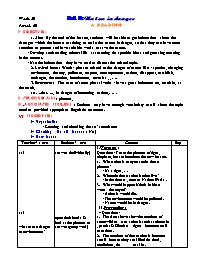Bài soạn môn học Tiếng Anh 11 - Period 60 - Unit 10: Nature in danger - A: Reading

I- OBJECTIVES:
1. Aim: By the end of the lesson, students will be able to get information about the damages which the human ear doing to make the nature in danger, so that they can have more attention to protect and have suitable works to save the nature.
- Develop such reading micro-skills as scanning for specific ideas and guessing meaning in the context.
- Use the information they have read to discuss the related topic.
2. Lexical items: Words/ phrases related to the danger of nature like : species, changing environmet, destroy, pollutant, respect, consequences, extinct, disappear, establish, endanger, destruction, interference, co-exist , , .
3. Structures: The uses of some phrasal verbs : have a great influence on, result in, as the result,
so .that ., in danger of becoming extinct,
II. TEACHING AIDS: pictures,
III. ANTICIPATED PROBLEMS: Students may have enough vocabulary to talk about the topic need to provided appropriate linguistic resources.
VI- PROCEDURES:
1- Organization:
- Greeting and checking the sts attendance
2- Checking the old lesson:( No )
Week: 20 Unit 10 : Nature in danger Period: 60 A- Reading I- objectives: 1. Aim: By the end of the lesson, students will be able to get information about the damages which the human ear doing to make the nature in danger, so that they can have more attention to protect and have suitable works to save the nature. - Develop such reading micro-skills as scanning for specific ideas and guessing meaning in the context. - Use the information they have read to discuss the related topic. 2. Lexical items: Words/ phrases related to the danger of nature like : species, changing environmet, destroy, pollutant, respect, consequences, extinct, disappear, establish, endanger, destruction, interference, co-exist , , . 3. Structures: The uses of some phrasal verbs : have a great influence on, result in, as the result, so .that.., in danger of becoming extinct, II. Teaching aids: pictures, III. Anticipated problems: Students may have enough vocabulary to talk about the topic need to provided appropriate linguistic resources. VI- Procedures: 1- Organization: - Greeting and checking the sts’ attendance 2- Checking the old lesson:( No ) 3- New lesson Teacher’ s acts Students’ acts Content Sup ask ask what causes danger to environment ? read & write the words on the board . explain Ask sts to scan the text and do task1 explain & correct ask sts choose the best sums up each paragraph. read & ask sts to answer check the answer & ask them to practice in pairs . ask sts to discuss in groups observe & correct mistakes answer (individually) open their books & look at the pictures to answer (group work) repeat & copy down. fill in each blank a suitable word individually work in group Do the task in pairs. Write down on the board Practise in pairs Copy down Work in groups Talk in front of class I. Warm up : Questions : T uses the pictures of tiger , elephant , bear to introduce the new lesson . 1. What animals can you see in these pictures ? - It’s a tiger , 2. Where do these animals often live ? - In the forests , zoos or National Parks . 3. What would happen if their habitats were destroyed? - Animals would die . - The environment would be polluted . - Nature would be in danger . II. Pre-reading : * Questions : 1. The facts above show the numbers of some wild or rare animals such as cheetahs , pandas & Siberian tigers become small or extinct . 2. The numbers of these animals become small because they are killed for food , medicines , fur or skin . 3. The things that causes danger to environment : - Wastes from factories & hospitals . - Smoke from vehicles . - Oils spills from ships. - Forests fires. - People ‘s carelessness * Vocabulary - co- exist (v) -devastate (v) = destroy (v) - extinct (a) - protect (v) - survive (v) - respect (n ) III. While Reading : Task 1: Fill in each blank with a suitable word : Key : 1. extinct , 2. protect , 3. decreasing , 4. pollutants , 5. endangered , 6. inference Task 2: Circle A,B,C or D that best sums up each paragraph. Key : 1. C , 2. B , 3. A , 4. C Task 3 : Answer the questions : 1. Four ways that people change the world are : - They are changing the environment by building cities and villages . -They are affecting the water supply by using water for industry and agriculture . -They are changing weather conditions by cutting down trees in the forests . - They are destroying the air by adding pollutants like smoke from factories and fumes from cars . 2. The serious consequences of people ‘s interference with the environment are : - Many kinds of rare animals are killed . - The environment where these animals are living is badly destroyed . - The numbers of rare animals are decreasing so rapidly that they are in danger of becoming extinct. 3. Many things have been done to protect endangered nature ,such as : - many organizations have been set up & money has been raised to save rare animals . - thousands of national parks have been established - laws have been passed to prohibit killing endangered animals . IV. After reading : Find out why some animals have become extinct . V. Homework : Find out the parts of speech (N, Adj , &Adv) of these words : exist , peace , natural , actively .
Tài liệu đính kèm:
 Av11(T60).doc
Av11(T60).doc





